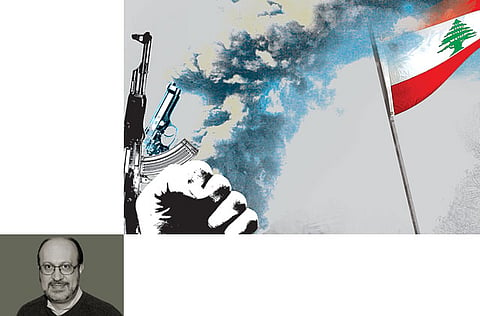Lebanon feels the heat as Syria melts
Nasrallah’s call to reinvent the Lebanese coexistence formula by adopting a fresh covenant and a redrafted constitution is a reaction to events in Damascus

Renewed kidnappings, intra-religious clashes, and senseless acts of violence throughout the country literally ensured a spillover of the Syrian Revolution into Lebanon. With the gradual disintegration of the Ba‘ath regime in Damascus just a matter of time, Syria’s political allies in Lebanon are scrambling to reinvent themselves and, if possible, to give meaning to their putative but challenged objectives.
To be sure, three specific groupings stand to lose most in this anticipated chaotic period, Hezbollah, Amal and the Syrian Social Nationalist Party, although many others will also fall victim to mistaken adherences. As Syria changes, Lebanon will inevitably follow suit, with the heretofore-sacrosanct future of all illegal arms finally resolved. Since the arms question is Hezbollah’s trump card, such a debate, and eventual resolution, will alter the existing political and military balance of power. In fact, the traditional answer that these weapons are to defend the country from Israeli aggression will no longer be a sufficient explanation, given the legacy of the 2006 War.
Anticipating upheavals, Hezbollah Secretary General Sayyid Hassan Nasrallah stressed the need to adopt a new strategy. If Sayyid Hassan’s past rhetoric concentrated on the need to adopt a “defence strategy,” the new formula focused on an updated foundation that, presumably, aimed to redesign Lebanon’s political blueprint by adopting a fresh Covenant and a redrafted Constitution. Inasmuch as his favorite triangle ‑—army, people and the resistance‑ gradually lost luster because senior Sunni and Maronite politicians stipulated its uselessness, the latest calls to reinvent Lebanon revealed the direction that parts of one of the country’s 18 officially recognised religious communities articulated.
To be sure, Hezballah’s legitimate argument centered around occupied territories at the Shiba‘ah Farms and the Kfar Shubah Hills along with parts of the village of Ghajar and, more important, of the failed duty of the state to liberate them. Yet, Sayyid Hassan and his advisors were aware of the demarcation problems between Lebanon and Syria, as well as the legacy of the 2006 War with Israel that proved to be, by the Secretary-General’s own avowal, “an error.” Of course, a contemporary charter and a pristine constitution did not guarantee liberation of occupied territories, but that was not the point of this fresh call to reinvent the Lebanese coexistence formula.
Simply stated, what Sayyid Hassan called for was a reincarnation of the covenant that stipulated political relationships between the Lebanese that, naturally, was eminently logical. Yet, what he failed to argue was the venue where such deliberations must occur for them to be affective, namely inside parliament. By relying on the street to impose his preferences, Sayyid Hassan absconded the parameters of political debates, oblivious that the street was seldom the proper venue to resolve opinionated quarrels.
In addition to accepting the logic of the law, which means respect for existing institutions no matter how inefficient, it was equally important to foster a sense of political belonging to what must surely be a nascent “nation.” Granted that Lebanon, like every similar entity with the exceptions of Japan and Korea, was a country and not a nation. Still, there was an aspiration towards that goal, one that in time wished to strengthen the heterogeneity of its peoples, while fostering relative equality under the law. This was a long-term objective but Lebanon’s nearly 70 years of independence was premised on democratisation that, Helter-skelter, allowed it to function well—warts and all.
It was worth recalling that at no time did Lebanese leaders surrender their particularities and, in fact, it was the very premise of the 1943 National Charter that citizens would maintain safe distances from all foreign powers that formed the foundation of the state. Beirut would be pro-Western without being beholden to the West (and thus satisfy portions of Christian communities), and pro-Arab without being beholden to the Arab World (and thus satisfy portions of Muslim communities). Few contemplated attachments to Iran that, noticeably, is now a fundamental dilemma.
Indeed, and though Sayyid Hassan declared that he did not foresee such an outcome, by forging an existential relationship with the Islamic Republic’s vilayet-e faqih, Hisballah transformed Lebanon’s ideological relationships. Beyond the military and financial aid that Iran disbursed to its regional allies, what the overwhelming majority of Lebanese rejected was the attachments to foreign powers, something that few were ready to alter.
The inevitable deteriorations in Syria confirmed that Lebanon’s system was under the threat of decomposition unless all parties placed the interests of the nascent republic above every other consideration. Those interests included five major themes that should be acceptable to all:
1. Uphold the National Charter and Constitution as amended by the 1989 Ta’if Accords;
2. Grant equality to all citizens under the same law;
3. Support a single military institution that defends the country from all foes;
4. Liberate occupied territories; and,
5. Cherish a unique form of democratization that allows unprecedented freedoms in a relatively tolerant environment.
It must be emphasised that no party ought to even contemplate to impose a fait accompli political and military solution over the Lebanese, since most are not ready to make any changes to their system of government, or even prepared to alter their identities. Most are loathe to align themselves with foreign powers, preferring to keep everyone at a safe distance, though welcoming peoples from around the world to enjoy what’s left of the country’s natural wonders.
Dr. Joseph A. Kechichian is the author of the forthcoming Legal and Political Reforms in Saudi Arabia.
Sign up for the Daily Briefing
Get the latest news and updates straight to your inbox



